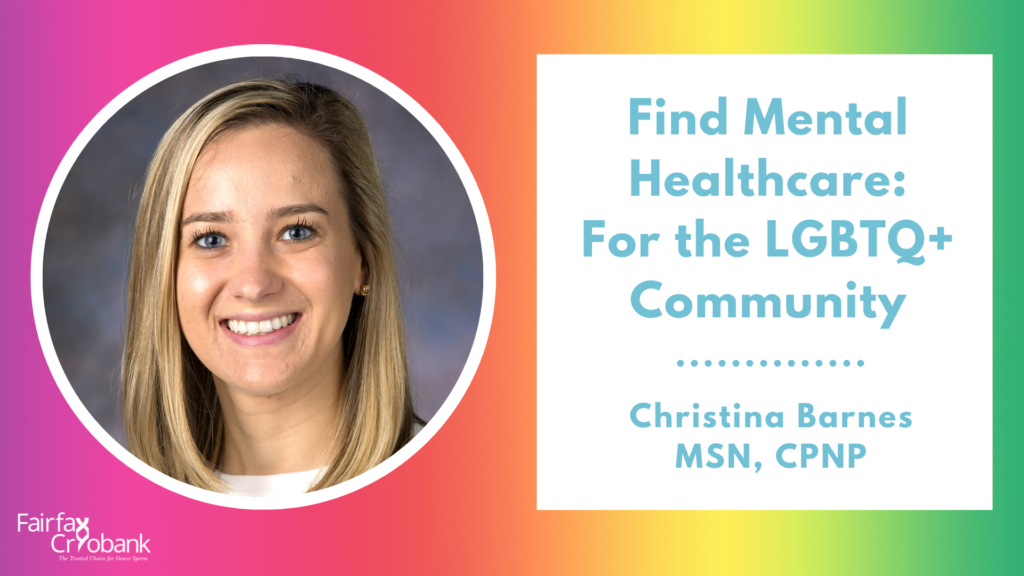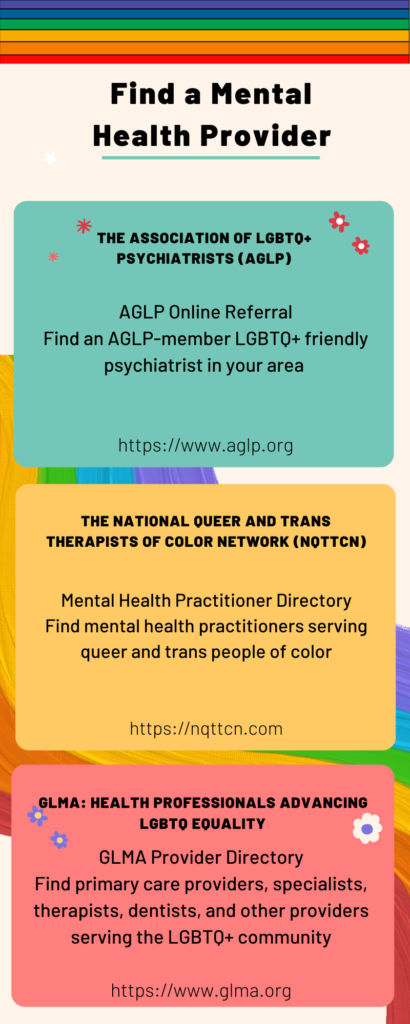Find Mental Healthcare: For the LGBTQ+ Community
Guest Blogger, Christina Barnes, MSN, CPNP, shares some mental health resources for the LGBTQ+ community.

Finding the right mental healthcare provider isn’t always easy. You need someone with the right education, experience, and credentials who you can talk to freely without fear of judgment. If you’re part of a minority community, it can be even more difficult finding someone who can empathize with your experiences. You shouldn’t have to compromise when it comes to your mental health care, and with these resources, you won’t have to.
In honor of Pride Month in June and Mental Health Awareness Month in May, I’ve pulled together some of the best resources for finding mental health providers for the LGBTQ+ community.
The first three organizations have searchable databases to look for specific therapists, psychiatrists, and other healthcare providers that you can work with long-term. The last item details insider tips from my work as a healthcare provider.
These resources are meant to help you find trustworthy, professional, long-term mental health care. Of course, if you are having a mental health crisis and need help right away, call 911. You can also get immediate help by calling a crisis hotline, such as the SAMHSA National Helpline, the National Suicide Prevention Lifeline, or the Crisis Text Line.

1. The Association of LGBTQ+ Psychiatrists (AGLP)
The AGLP is a community of psychiatrists focused on LGBTQ+ mental health issues. The group works to educate the larger healthcare community on appropriate LGBTQ+ mental health care. The AGLP also serves as a safe space for LGBTQ+ psychiatrists who, until as recently as the 1970s, were at risk of losing their medical licenses because of their sexual orientations.
If you’re a member of the LGBTQ+ community trying to find a psychiatrist, the AGLP has an online search tool to help you find a psychiatrist in your area. The psychiatrists listed aren’t necessarily LGBTQ+ themselves, but they are members of the AGLP.
2. The National Queer and Trans Therapists of Color Network (NQTTCN)
The NQTTCN is an organization committed to transforming mental health care for queer and trans people of color (QTPoC). In addition to working with healthcare providers and social justice groups, they have excellent resources for people in the QTPoC community seeking mental health care.
Mental Health Practitioner Directory
This searchable directory connects users with mental health practitioners. Anyone can use the directory; you don’t have to be queer, trans, or a person of color to see these therapists and doctors. Profiles for practitioners include websites and prices as well as the practitioner’s gender identity and sexual orientation.
The NQTTCN also offers a Mental Health Fund to provide financial support for up to 6 sessions with a psychotherapist. Those interested can apply online and can request up to $100 per session.
3. GLMA: Health Professionals Advancing LGBTQ Equality
GLMA is a professional membership association of LGBTQ+ healthcare professionals and allies. Founded in 1981, GLMA’s mission is to ensure equality for LGBTQ+ patients and healthcare professionals through advocacy, education, and research.
This online directory lists primary care providers, specialists, therapists, dentists, and other healthcare providers who serve the LGBTQ+ community. Search options include geographic location, community partner affiliation, specialty, and gender transitioning services, among others.
4. Ask a Trusted Healthcare Provider for Recommendations
Healthcare providers are part of a large community, and good providers work hard to maintain positive relationships with others. Use this to your advantage!
When I worked in pediatric surgery, my coworkers and I knew who the best pediatric psychiatrists and therapists were in the area. We didn’t work directly with them, but we knew who our patients saw for mental healthcare, and we knew which of those providers did a good job. If any of my patients had asked me for recommendations on who to see for therapy or psychiatric medications, I could have easily put together an informal list of doctors and therapists for them.
If you have a doctor you trust, even if they don’t work in mental health, ask them for recommendations. Chances are they know someone, and even if they don’t, they can send you in the right direction. This is true of any specialty, not just mental health.

Next Steps
You’ve found the names of a few doctors or therapists you like. Now what?
As you narrow down your list, consider insurance coverage and cost. Some providers don’t take insurance, which means you’ll have to pay them the full amount for each visit. You can submit forms to your insurance for reimbursement, but you may get only some of what you paid.
Keep in mind logistics like location and telehealth services. Would you prefer to see your therapist in person? Do you want the flexibility of virtual visits? You will probably see your new therapist regularly, so the visits need to be able to fit into your regular life.
Don’t be discouraged if your first choice can’t see you right away. It’s not uncommon for new patients to wait weeks or months for their first appointment. If the provider isn’t taking any new patients, try someone else on your list or ask to see a different provider in their practice.
Once you’ve decided on your top choice, contact their office to schedule an appointment. If after a few appointments you feel like they’re not a good fit, that’s okay – try someone else. Finding good mental health care takes time and work, but the rewards are well worth the effort.







